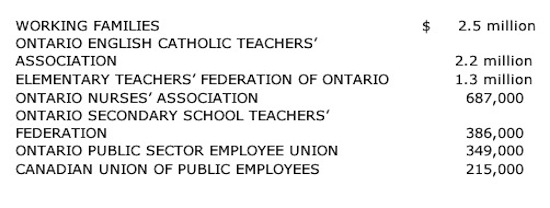This past week Elections Ontario released the details of spending by unions in the 2014 Ontario provincial general election. The data show that overall Third Party spending totaled almost $9 million, an increase of 43% from such spending in the 2011 election. And unions or union-affiliated groups were the only ones to spend over $100,000.
The total spending by unions was in excess of $7.5 million. This only included direct advertising in the election during the writ period. It does not include the tens of thousands of hours spent by members of those unions in election efforts and the considerable amount of advertising by unions that did not fall within the writ period. Ontario is the only jurisdiction in Canada in which such large sums can be spent on advertising by any group. Every other province and the federal rules strictly limit what can be spent by anyone, whether an individual, corporation, union or other.
Most Canadians do not want to see this type of advertising but it is used because it works. As union dues are mandatory in Canada, unlike most other countries, unions have an enormous amount of money. “It should simply not be legal for unions or anyone else to spend such massive amounts of money to effectively corrupt the democratic process during Ontario elections,” stated Catherine Swift, Spokesperson for Working Canadians. She added “This type of costly advertising gives excessive influence to these groups, at the detriment of others. And as unions only represent 30 per cent of Ontario workers, the majority of Ontarians are harmed when governments are beholden to unions.”
Most of the biggest donors to union advertising campaigns were government unions. When government unions are consistently favoured by union-friendly governments with rich wage and benefit settlements, the 80% of taxpayers who work in the private sector are the losers. Swift added, “The current dire state of Ontario’s economy is in large part a result of overly costly government financed by a weakening private sector. We have seen the endgame of that type of situation in places such as Greece, Detroit and elsewhere, and it’s not pretty.”
And of course, it does not matter who the union member supports politically, as the union bosses decide which political parties should be supported or opposed. In those countries that do force employees to pay union dues, there is also a requirement of unions that those dues be spent only for collective bargaining purposes. Canada has no such limitation on how the forced dues are spent, which leads to the kind of abuses we saw in the 2014 Ontario election.
Who were the big spenders?

In Ontario the single biggest expense the province has is the salaries, benefits and pensions of the same workers who contributed so handsomely to the election. This cost is estimated at about 60% to 70% of total government spending. “Continuing to excessively reward government workers at the cost of the private sector is a recipe for disaster,” noted Swift. “Ontario should get in line with the rest of the country and strictly limit election-related spending for everyone, whether they are corporations, unions, individuals or other parties.”
Working Canadians are volunteer individuals concerned that union leaders have too much influence over government. Due to this influence they drive up taxes, debt and deficits and make it harder for people and businesses to get ahead and create jobs. www.workingcanadians.ca  In Ontario the single biggest expense the province has is the salaries, benefits and pensions of the same workers who contributed so handsomely to the election. This cost is estimated at about 60% to 70% of total government spending. “Continuing to excessively reward government workers at the cost of the private sector is a recipe for disaster,” noted Swift. “Ontario should get in line with the rest of the country and strictly limit election-related spending for everyone, whether they are corporations, unions, individuals or other parties.”
Working Canadians are volunteer individuals concerned that union leaders have too much influence over government. Due to this influence they drive up taxes, debt and deficits and make it harder for people and businesses to get ahead and create jobs. www.workingcanadians.ca
In Ontario the single biggest expense the province has is the salaries, benefits and pensions of the same workers who contributed so handsomely to the election. This cost is estimated at about 60% to 70% of total government spending. “Continuing to excessively reward government workers at the cost of the private sector is a recipe for disaster,” noted Swift. “Ontario should get in line with the rest of the country and strictly limit election-related spending for everyone, whether they are corporations, unions, individuals or other parties.”
Working Canadians are volunteer individuals concerned that union leaders have too much influence over government. Due to this influence they drive up taxes, debt and deficits and make it harder for people and businesses to get ahead and create jobs. www.workingcanadians.ca